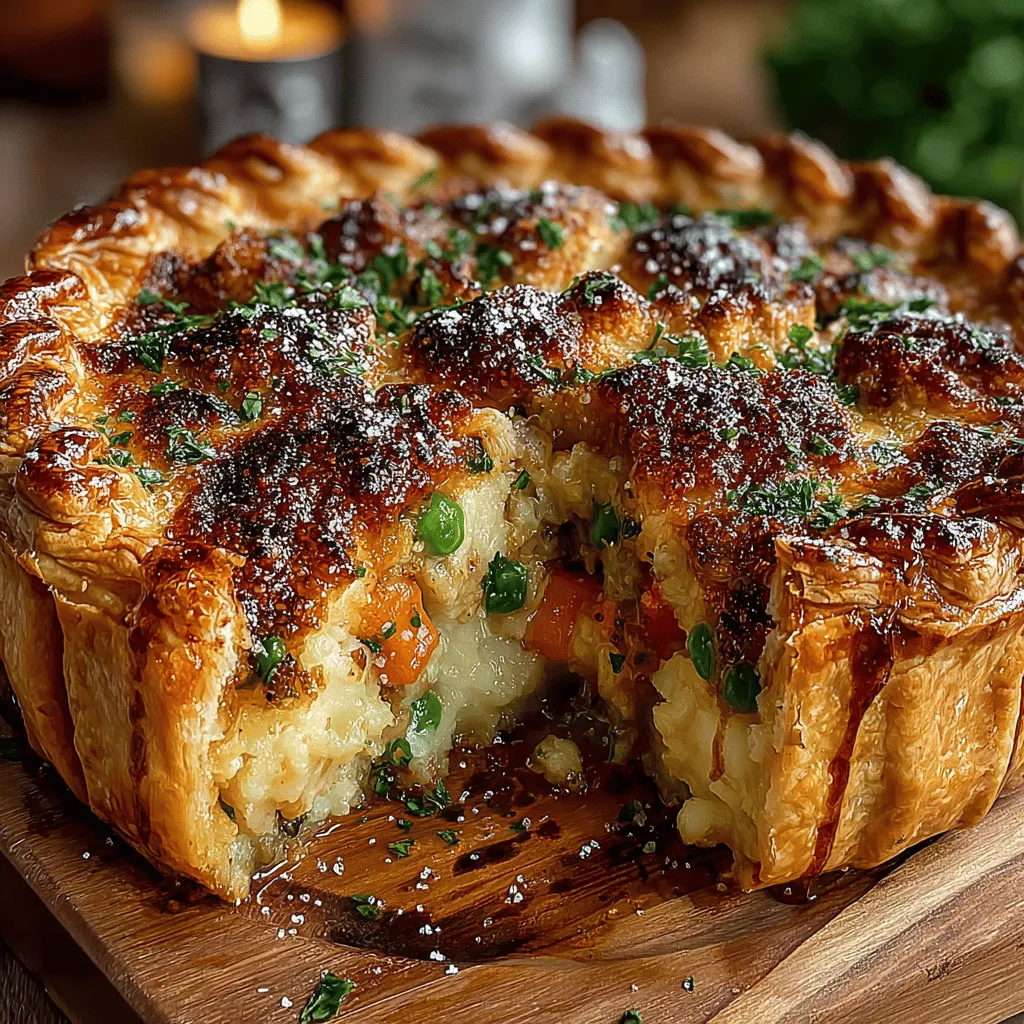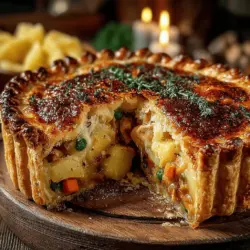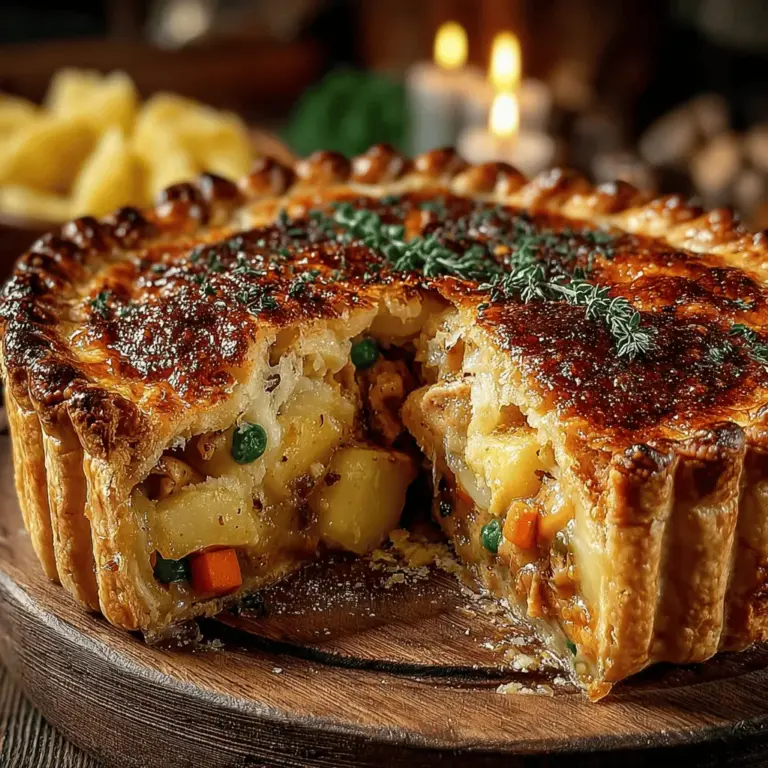Cozy Comfort: Savory Chicken Pot Pie
Introduction
Comfort food holds a special place in the hearts of many. It evokes feelings of nostalgia, warmth, and security, often reminding us of cherished moments spent around the dining table with family and friends. Among the many comforting dishes that grace our tables, Chicken Pot Pie stands out as a quintessential favorite. This dish, rich in history and flavor, combines tender chicken, vibrant vegetables, and a creamy sauce, all enveloped in a flaky, golden crust. It’s not just a meal; it’s a hug in a dish, perfect for those cold evenings or when you simply need a little extra comfort.
In this article, we’ll dive into the world of Chicken Pot Pie, exploring its historical significance, the evolution of its recipe, and what makes it a staple in modern home cooking. You can expect a detailed breakdown of our savory Chicken Pot Pie recipe, including insights into the ingredients that bring this dish to life. Whether you are a seasoned chef or a beginner in the kitchen, this recipe is designed to be approachable and delightful, ensuring that you can create a comforting masterpiece with ease.
Understanding Chicken Pot Pie
To truly appreciate Chicken Pot Pie, it’s important to recognize its historical roots. Variations of pot pie can be traced back to ancient civilizations, where meats and vegetables were encased in crusts to preserve their flavors and make them easy to transport. The concept of a pot pie evolved significantly over the centuries, with different cultures adding their unique twists. In England, for instance, the pot pie became a beloved dish in the 18th century, often featuring game meats and a rich gravy, while Americans adapted it with locally available ingredients, particularly chicken and vegetables.
Over time, Chicken Pot Pie has transitioned from a rustic dish to a beloved comfort food across various cultures. Its appeal lies in its versatility; it can be made with different proteins and vegetables, allowing for endless variations. Today, Chicken Pot Pie is celebrated not only for its flavor but also for its ability to bring people together. It serves as a reminder of home-cooked meals and the joy of sharing food with loved ones.
The key to crafting a memorable Chicken Pot Pie lies in the ingredients. Using fresh, high-quality components makes a significant difference in flavor and texture. Whether it’s the tender chunks of chicken, the crisp vegetables, or the buttery crust, each ingredient plays a crucial role in creating a dish that warms the soul.
The Recipe Breakdown
This Chicken Pot Pie recipe is structured to focus on two main components: the savory filling and the flaky crust. Both elements are essential for achieving balance and delivering the comforting experience that this dish promises. Let’s break down each part to ensure you have a clear understanding before we dive into the cooking process.
Ingredients for the Filling
1. Cooked Chicken: The star of the dish, cooked chicken provides protein and creates a hearty base. You can use leftover rotisserie chicken or poach your own for a fresher taste. The key is to ensure the chicken is tender and flavorful.
2. Vegetables: A medley of vegetables enhances the richness of the filling. Common choices include:
– Carrots: They add sweetness and vibrant color.
– Peas: These little green gems contribute a pop of flavor and texture.
– Potatoes: Diced potatoes provide bulk and heartiness to the filling.
– Celery: This adds a refreshing crunch and balances the richness.
– Onion and Garlic: Essential aromatics that form the foundation of the dish, infusing it with flavor.
3. Butter and Flour: These ingredients create the roux, which thickens the filling. Butter brings richness, while flour helps achieve the desired creamy consistency.
4. Chicken Broth and Heavy Cream: Together, they create the luscious sauce that binds the filling. Chicken broth adds depth of flavor, while heavy cream brings richness that makes each bite indulgent.
5. Herbs: Fresh herbs like thyme and rosemary enhance the aroma and flavor profile, adding a touch of earthiness that complements the chicken and vegetables beautifully.
6. Salt and Pepper: Essential seasonings that elevate the overall taste, bringing out the natural flavors of the ingredients.
Ingredients for the Flaky Crust
1. All-Purpose Flour: The foundation of the crust, it provides structure. Choosing the right type of flour is crucial for achieving that perfect texture.
2. Salt: A small amount of salt enhances the flavor of the crust, ensuring it’s not bland.
3. Unsalted Butter: The key to achieving a flaky crust, butter should be cold and cut into small pieces before being incorporated into the flour. The cold butter creates steam during baking, resulting in a beautifully layered texture.
4. Ice Water: This is added to bring the dough together. Using ice water helps keep the butter cold, which is essential for a tender crust.
With a clear understanding of the ingredients and their roles, you’re well-prepared to begin the journey of making your very own Chicken Pot Pie. In the next part, we will guide you through the preparation and cooking process, ensuring that you can create a dish that not only satisfies your cravings but also impresses your family and friends. Stay tuned for tips and techniques that will elevate your pot pie to new heights!

Egg Wash: For a Golden Finish
An egg wash is a simple mixture of beaten egg and water or milk that serves a critical function in baking, especially for crusts. This mixture brushed on top of your chicken pot pie before baking creates a beautiful golden-brown finish that not only enhances the visual appeal but also adds a slight sheen to the crust. For the perfect egg wash, combine one egg with a tablespoon of water or milk and whisk until smooth. Use a pastry brush to apply it evenly over the surface of the pie before it goes into the oven.
Preparation Steps
Step-by-Step Guide to Preparing the Crust
Mixing and Combining Dry Ingredients with Butter
The crust is the foundation of any pie, and for your chicken pot pie, it’s essential to get it just right. Begin by measuring 2 ½ cups of all-purpose flour into a large mixing bowl. To this, add 1 teaspoon of salt and mix well. Cut in 1 cup (two sticks) of cold, unsalted butter using a pastry cutter or your fingers until the mixture resembles coarse crumbs. The cold butter is vital as it helps create a flaky texture in the baked crust.
Importance of Chilling the Dough for Texture
Once the butter is incorporated, it’s important to chill the dough. Form the mixture into a ball, flatten it into a disk, wrap it in plastic wrap, and refrigerate for at least 30 minutes. Chilling the dough allows the gluten to relax, which results in a tender crust that won’t shrink during baking. The cold temperature also keeps the butter solid, contributing to a flaky texture.
Step-by-Step Guide to Cooking the Filling
Sautéing Vegetables and the Significance of Each Step in Building Flavor
While the dough chills, focus on the filling. Start by heating 2 tablespoons of olive oil in a large skillet over medium heat. Add 1 cup of diced onions, 1 cup of diced carrots, and 1 cup of frozen peas. Sauté the vegetables for about 5-7 minutes until they soften and begin to caramelize. This process builds layers of flavor that will enhance the overall taste of your pot pie. Don’t skip this step; it’s where the dish gains its depth.
Gradually Thickening the Filling to Achieve the Right Consistency
Next, sprinkle 1/3 cup of all-purpose flour over the sautéed vegetables and stir for about 2 minutes to cook out the raw flour taste. Gradually whisk in 3 cups of chicken broth, ensuring there are no lumps. Bring the mixture to a simmer and cook until it thickens, about 5-10 minutes. At this point, add 2 cups of cooked, shredded chicken, salt, pepper, and any additional seasonings you desire (like thyme or rosemary). The filling should be creamy and thick enough to hold its shape when spooned into the crust.
Assembling the Chicken Pot Pie
Detailed Instructions for Rolling Out the Dough and Fitting It Into the Pie Dish
Once your filling is ready, it’s time to assemble the pot pie. Preheat your oven to 425°F (220°C). Take the chilled dough from the refrigerator and divide it into two portions: one for the bottom crust and one for the top. Roll out the first portion on a lightly floured surface until it’s about ¼ inch thick. Carefully transfer the rolled dough into a 9-inch pie dish, ensuring it fits snugly without any tears.
Tips for Properly Sealing the Pie and Cutting Steam Vents
After pouring the filling into the crust, roll out the second portion of dough for the top. Place it over the filling, pressing the edges together to seal. Use your fingers to crimp the edges for a decorative touch, and don’t forget to cut several steam vents in the top crust. These vents allow steam to escape during baking, preventing a soggy crust and ensuring even cooking.
Importance of the Egg Wash for Visual Appeal
Before placing your pie in the oven, brush the top crust with the prepared egg wash. This step is crucial for achieving that golden-brown color and glossy finish. It also helps to prevent the crust from burning while baking.
Baking the Pot Pie
Explanation of the Baking Process and What to Look for in Terms of Doneness
Bake the pot pie in the preheated oven for 30-40 minutes or until the crust is golden and the filling is bubbling. Keep an eye on the pie during the last few minutes of baking; if the edges start to brown too quickly, cover them with strips of aluminum foil to prevent burning.
Suggestions for Using a Baking Sheet to Prevent Messes
To catch any drips that may overflow, place the pie dish on a baking sheet before putting it in the oven. This simple step saves you from having to scrub the oven later.
Serving Suggestions
Ideas for Accompanying Side Dishes or Garnishes that Complement the Pot Pie
Chicken pot pie is a complete meal on its own, but you can enhance your dining experience with a few simple side dishes. Consider serving it alongside a fresh green salad dressed in a light vinaigrette or steamed vegetables for a burst of color and freshness. For a comforting touch, a side of mashed potatoes or roasted root vegetables would be delightful.
Discussing the Best Ways to Serve and Enjoy the Dish While It’s Warm
When it’s time to serve your chicken pot pie, let it cool for about 10 minutes before slicing. This resting time allows the filling to set, making it easier to cut neat portions. Serve it warm, perhaps garnished with a sprinkle of fresh herbs like parsley or thyme for added flavor and presentation.
Nutritional Information
Overview of the Dish’s Nutritional Benefits, Including Protein Content from Chicken and Vitamins from Vegetables
Chicken pot pie is not only delicious but also nutritious. Each serving provides a good source of protein from the chicken, while the variety of vegetables contributes essential vitamins and minerals. Carrots are rich in beta-carotene, peas are a good source of vitamin K, and onions provide antioxidants, making this dish a balanced choice for family meals.
Discussion on Potential Dietary Modifications (e.g., Gluten-Free Crust Options)
For those with dietary restrictions, chicken pot pie can be easily modified. A gluten-free crust can be made with alternative flours such as almond or coconut flour. Alternatively, you can use store-bought gluten-free pie crust options that are widely available. Feel free to experiment with vegetables to suit your dietary preferences or to add more nutritional variety.
Conclusion
Chicken pot pie is the epitome of comfort food, bringing warmth and satisfaction to any meal. The joy of homemade cooking shines through in each flaky crust and savory bite, making it a cherished family favorite. We encourage you to try your hand at this delightful dish, and don’t hesitate to share your experiences with friends and family. Whether enjoyed on a chilly evening or served at a gathering, chicken pot pie is sure to create lasting memories around the dinner table. Happy cooking!

